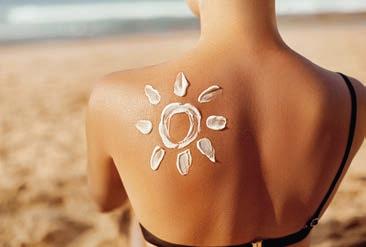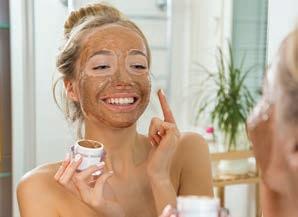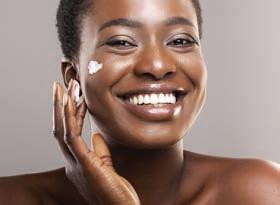
3 minute read
sKiNCARe
SUMMER SKINCARE
advice from dermatologists
While you should be looking after your skin all year round, here are some tips from the experts on what you should keep top of mind this season. By Thando Pato
ALWAYS USE SUNBLOCK
Everyone needs to wear sunscreen throughout the year, no matter what the season, says dermatologist Dr Nomphelo Gantsho from the Cape Skin Doctor practice. Sun protection factor (SPF), she says, refers to sunscreen’s ability to shield your skin from the sun’s ultraviolet rays. “SPF is the measure of time it will take for a person to start burning if they apply the sunscreen as directed. Everyone needs to apply a broad-spectrum sunscreen, containing UVA and UVB photoprotection, with an SPF of at least 30 for dark skin and 50 for fair skin.”
Dermatologist Dr Dilshaad Asmal recommends applying a shot glass size amount of sunscreen to your face and body, and reapplying it every two hours if you swim, sweat, or spend long periods outdoors. Sunblock helps to minimise sunburn, but doesn’t completely prevent it,” she says.
TREATING SUNBURN
Asmal says symptoms of sunburn include a dramatic change in skin tone with hints of red, pain or tenderness at the affected area, swelling and, in extreme cases, blisters. “You can also suffer systemic symptoms such as headache, nausea, fatigue, gritty eyes and dehydration.”
For mild sunburn, both doctors recommend taking cool baths or showers. If you opt for a bath, add 60g baking soda, suggests Asmal. Gantsho says: “As soon as you get out of the bathtub or shower, gently pat yourself dry, but leave a little water on your skin. Then apply a moisturiser to help trap the water in your skin; this can help ease the dryness. Use a moisturiser that contains aloe vera or soy to help soothe the sunburn.” Asmal advises taking anti-inflammatory tablets to help reduce any swelling or discomfort, and drinking lots of water to prevent dehydration.
In the case of severe sunburn, where there is redness on your skin, pain and blistering, Gantsho advises seeking medical assistance immediately. “Take extra care to protect sunburned skin while it heals. Wear clothing – tightly woven fabric works best – that covers your skin when outdoors.”
LOAD UP ON VITAMINS


Vitamin C is a natural antioxidant and encourages collagen production in the skin, helping to protect it from sun damage, which is why it is found in most anti-ageing products. “Vitamin C is necessary for growth and development and is essential for repairing body tissues. It can enhance the effectiveness of sunscreen and help to repair dry skin,” says Asmal.
Other vitamins that are good for your skin include vitamin D and E, says Gantsho.
“Vitamin D is one of the best vitamins for your skin; it helps reduce the amount of inflammation and irritation to your skin. Vitamin E is an antioxidant, its main function in skincare is to protect against sun damage and treat inflammation. Vitamin E also assists sebum production to help improve dry skin.”
GET RID OF DEAD SKIN
Exfoliating your skin, body and face is important to remove layers of dry, dead skin and unclog pores. Gantsho recommends exfoliating a maximum of once or twice a week, using a gentle scrub. “Start slow,” says Asmal, “don’t start doing three exfoliations a week, rather start exfoliating every ten days then increase the frequency. If you overexfoliate your skin, it will become irritated, dry and damaged.”
She recommends using exfoliating bath mittens for the body. “Be gentle, if you are rough, you can cause tiny tears in the skin. Use small circular motions. Don’t exfoliate if skin is traumatised or sunburnt,” she concludes.


USE LIGHTER SKIN CARE PRODUCTS
Your skin products should be seasonal to protect your skin and work effectively against the climate. Asmal says that in summer, you should use a gentle foaming cleanser and a lightweight SPF 30 moisturiser. “Moisturisers or sunscreen that are too thick can lead to blocked pores, inflammation and acne,” she explains. Asmal recommends using serums containing vitamin C, which will assist with pigmentation, fine lines, and collagen production. Too-hot showers, she says, may sensitise the skin and cause inflammation. Women should also consider lighter make-up foundations in the summer to avoid clogged pores.









